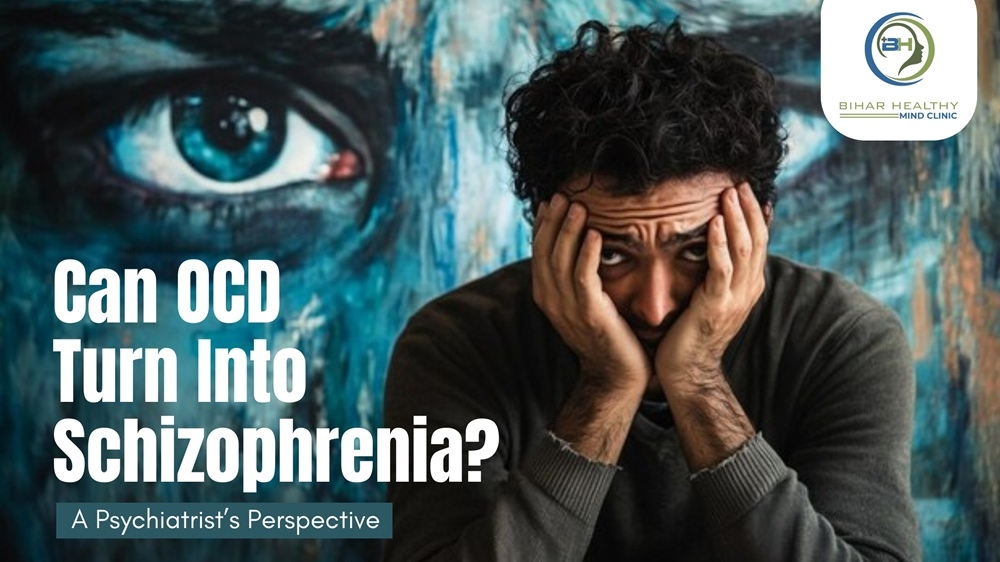
Mental health often brings with it complex and overwhelming questions, especially when two conditions share certain overlapping features. Among these, one of the most debated and concerning queries many patients and families ask is, "Can OCD turn into schizophrenia?"
Obsessive-Compulsive Disorder (OCD) and schizophrenia are two distinct psychiatric conditions. While both may involve intrusive thoughts and unusual behaviors, their underlying causes, progression, and treatments are fundamentally different. At Patna Psychiatry, under the guidance of Dr. Saurabh Kumar, MD (Psychiatry), who is widely recognized as the best psychiatrist in Patna, patients receive a clear, evidence-based understanding of such conditions along with personalized treatment approaches.
In this blog, we will explore the relationship between OCD and schizophrenia, the possibility of one turning into the other, and what individuals and families should know when dealing with these disorders.
Understanding OCD: Beyond Repetitive Thoughts and Rituals
Obsessive Compulsive Disorder is characterized by recurring intrusive thoughts (obsessions) and repetitive behaviors (compulsions) performed to reduce anxiety. Common examples include excessive handwashing, checking locks repeatedly, or constant reassurance-seeking.
While these behaviors may appear irrational to an outsider, for someone living with OCD, they are driven by intense anxiety and a pressing need to neutralize their distressing thoughts. Importantly, individuals with OCD usually maintain insight; they recognize their thoughts and behaviors are irrational, yet struggle to control them.
Understanding Schizophrenia: A Disorder of Perception and Reality
Schizophrenia, on the other hand, is a severe mental disorder involving distorted thinking, hallucinations, delusions, and disorganized speech or behavior. Unlike OCD, schizophrenia often impairs insight, meaning the person may not recognize their experiences as abnormal.
This lack of awareness, combined with symptoms like paranoia or hearing voices, significantly impacts day-to-day functioning and requires long-term psychiatric intervention.
OCD and Schizophrenia: The Overlap
The discussion about “OCD schizophrenia” often arises because of certain similarities:
- Both involve intrusive and repetitive thoughts.
- Both can cause significant distress and functional impairment.
- Some patients with schizophrenia may show obsessive or compulsive traits.
These overlapping symptoms sometimes create confusion during diagnosis. However, having OCD does not mean an individual will inevitably develop schizophrenia.
Can OCD Turn Into Schizophrenia?
From a psychiatric perspective, OCD does not directly transform into schizophrenia. They are two different disorders with distinct diagnostic criteria. However, research suggests that there can be co-occurrence in some cases. This condition is sometimes referred to as schizo-obsessive disorder, where features of both OCD and schizophrenia exist simultaneously.
A small percentage of people diagnosed with OCD may later develop psychotic symptoms, but this does not mean OCD itself “turns into” schizophrenia. Instead, it highlights the complexity of mental health and the possibility of comorbid conditions.
Why Does the Confusion Exist?
The confusion around whether OCD can progress to schizophrenia often stems from:
- Intrusive Thoughts vs. Delusions:
- In OCD, intrusive thoughts are ego-dystonic (the patient knows they are irrational).
- In schizophrenia, delusions are ego-syntonic (the patient believes them to be true).
- Insight Differences:
- People with OCD usually maintain awareness.
- In schizophrenia, insight is frequently absent.
- Shared Neural Pathways:
- Some neurobiological studies suggest overlapping brain circuits, which may explain why symptoms sometimes resemble each other.
Treatment Approaches: Addressing Both Disorders
At Patna Psychiatry, treatment is highly individualized. Here’s how each condition is usually managed:
- For OCD:
- Cognitive Behavioral Therapy (CBT), especially Exposure and Response Prevention (ERP).
- Medications such as SSRIs to reduce obsessive thoughts.
- Stress management and lifestyle modifications.
- For Schizophrenia:
- Antipsychotic medications to manage hallucinations and delusions.
- Psychosocial rehabilitation to improve daily functioning.
- Long-term therapy and family support.
In cases where both conditions coexist, a careful balance of therapies is essential. For example, some medications used in schizophrenia may worsen obsessive symptoms, requiring close monitoring by a skilled psychiatrist.
The Role of Early Diagnosis and Expert Care
The key to managing concerns about OCD and schizophrenia lies in early diagnosis and continuous psychiatric care. Misdiagnosis can lead to delayed treatment, which may worsen symptoms and affect quality of life.
This is why consultation with an experienced professional like Dr. Saurabh Kumar, the best psychiatrist in Patna, is vital. With a comprehensive evaluation, he ensures that conditions are correctly identified and managed with the most effective evidence-based strategies.
Living with OCD or Schizophrenia: Hope and Recovery
Although both OCD and schizophrenia can significantly affect life, timely treatment allows patients to regain stability and functionality. At Patna Psychiatry, the emphasis is on not just reducing symptoms but also enhancing overall well-being.
Families are also guided on how to provide support, build understanding, and encourage adherence to treatment plans. This holistic approach ensures that recovery is sustainable.
Final Thoughts
So, can OCD turn into schizophrenia? The straightforward answer is no—OCD does not transform into schizophrenia. However, in rare cases, both can co-occur, making professional evaluation essential.
If you or a loved one struggles with obsessive thoughts, compulsive behaviors, or unusual changes in perception, seeking help early is crucial. With the right guidance from a trusted professional such as Dr. Saurabh Kumar at Patna Psychiatry, recovery is not only possible but also sustainable.
Mental health may be complex, but with awareness, accurate information, and expert treatment, individuals can lead fulfilling lives free from stigma and fear.
Visitors: 126





No comments yet.